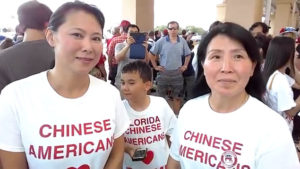On 28 October, a plane flew over Seattle towing an aerial banner with an American flag and the words ‘WA CHINESE AMERICANS FOR TRUMP’. (WA stands for Washington State.) Chinese Americans for Trump, which by November claimed upwards of 6,000 members across thirty states, was the brainchild of David Tian Wang, himself only a Green-Cardholder. He told Seattle radio station KUOW that Chinese Americans supported Trump on immigration and national security. He also cited resentment against affirmative action programs supporting access to education for students from underprivileged backgrounds, which, he said, ‘Chinese Americans see as disadvantaging their own children’s chances of getting into good universities’.
Two decades ago, the Republican Party, as the party of business, could count on a good proportion of the Chinese American vote. But over the last twenty years, this has changed dramatically, to the point that Chinese Americans, like Asian Americans overall, tend to vote Democrat. In 2012, Obama commanded seventy-three percent of the Asian-American vote and support grew through 2016. A commonly cited reason for this is the rise of exclusionary, anti-multicultural, anti-immigrant rhetoric on the right.
After all, among the ‘undocumented immigrants’ who have been such a focus of Trump’s ire are nearly 1.5 million people of Asian origin. What’s more, twenty-one percent of the 3.3 million Muslims in the US identify racially as Asian (including South and Central Asian); it’s safe to assume that Trump’s fanning of anti-Muslim sentiment would have upset this significant group of Asian Americans as well. Both populations — undocumented migrants and Muslims — include ethnic Chinese.
But at least one segment of the Chinese American population was vocal in its support of Trump: first-generation, relatively recent immigrants. Daniel Deng, a Chinese American attorney from California (and Clinton supporter) told the Los Angeles Times that they appeared to be unaware that the kind of exclusionary laws Trump was proposing for Muslims had once been aimed at the Chinese community: they didn’t know, he said, ‘what Chinese Americans have been through’.
The American Chinese journalist and podcaster Kaiser Kuo conducted conversations with dozens of Trump-boosting Chinese Americans. They confirmed that dislike for affirmative action and approval of Trump’s views on immigration were big factors in their support. He also found that they tended to share the Trump team’s hard-line conservative views on homosexuality. They were worried about law and order, conflating ‘blackness with criminality’. They were wary of Clinton’s hawkishness and her commitment to Obama’s Pivot to Asia policy. They resented having to pay taxes (apparently failing to link tax revenue with the education they so valued for their children). They liked that he was a businessman. Some spoke in terms of the advantages of the ‘genuine petty person’ 真小人 (Trump) over the ‘hypocritical gentleman’ 伪君子 (Clinton).
In a YouTube video titled ‘Chinese Americans for Trump’, a middle-aged Chinese-born voter in a Trump t-shirt rants against America’s drift to the ‘left’ and looks forward to Trump returning it to the ‘right’. As for claims Trump is a racist: ‘That’s a big lie,’ she insists, perpetuated by the ‘leftist media’.
One older immigrant, a Chinese university graduate of the class of 1977, told Kuo that the Chinese American Trump supporters ‘reminded her of nothing so much as the Red Guards during the Cultural Revolution’. Just switch ‘left’ for ‘right’ and you get the idea.
Even Trump’s attacks on China did not dim their enthusiasm — as Kate Linthicum wrote in the Los Angeles Times: ‘… some Chinese-born Trump supporters say his focus on China invokes pride in their native country’s economic prowess’.
The anonymous woman in the YouTube video referred numerous times to how Trump represented her ‘American dream’. Yet Kuo writes that a number of the Trump supporters with whom he spoke were aware that their candidate might well end up trashing the American economy, the country’s image abroad, and democracy itself — and didn’t care. Indeed, Haoyu Wang 王浩宇, a student at the University of Washington who claimed to harbour no feelings of hostility towards the US, admitted to feeling delighted at the prospect of a Trump presidency. As he told Seattle’s KUOW: ‘We don’t like Trump as a person, but we like him as a tool to kind of bring America down’.
Notes
Amy Radil, ‘Why some Chinese-Americans support Trump (it has nothing to do with China), KUOW, 2 November 2016, online at: http://kuow.org/post/why-some-chinese-americans-support-trump-it-has-nothing-do-china
Cecilia Hyunjung Mo, ‘Why Asian Americans don’t vote Republican’, The Observer, 2 February 2016, online at: http://observer.com/2016/02/why-asian-americans-dont-vote-republican/
Kate Linthicum, ‘Meet the Chinese American immigrants who are supporting Donald Trump, Los Angeles Times, 27 May 2016, online at: http://www.latimes.com/politics/la-na-pol-asian-voters-20160527-snap-story.html
Kaiser Kuo, ‘Why are so many first-generation Chinese immigrants supporting Donald Trump?’, SupChina, November 2016, online at: http://supchina.com/2016/11/03/many-first-generation-chinese-immigrants-supporting-donald-trump/
‘Chinese Americans for Trump’ https://www.youtube.com/watch?v=gvA6gHNdis0




